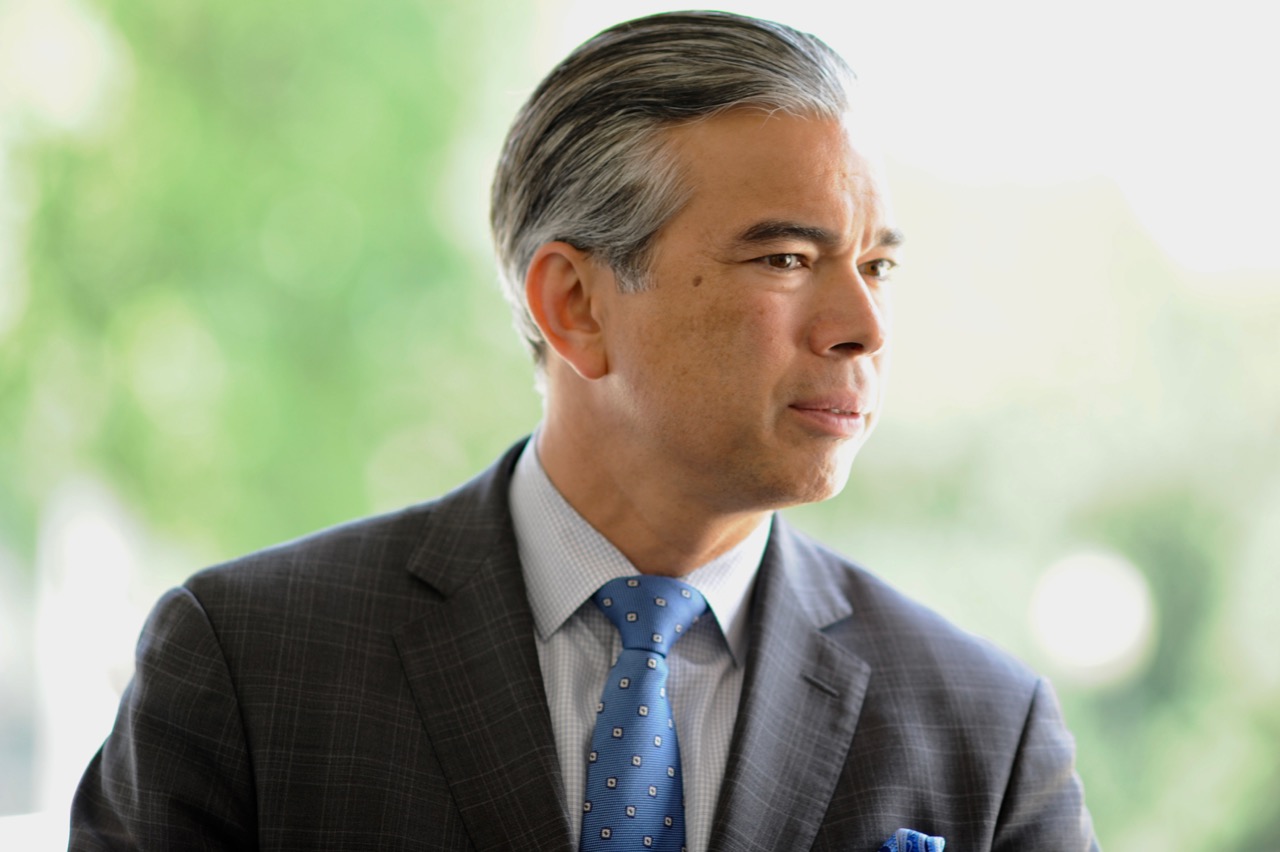
Woman checks sales receipt after purchasing food in a grocery store. (Photo: goffkein.pro/Shutterstock)
FTC, Calif. AG Lawsuits to Block Kroger-Albertson’s Supermarket Merger
‘The merger is expected to reduce the ability of unions to negotiate working conditions at these stores’
By Katy Grimes, March 7, 2024 2:45 am
The Federal Trade Commission announced in late February it had filed a lawsuit to block the largest proposed supermarket merger in U.S. history—Kroger Company’s $24.6 billion acquisition of the Albertsons Companies, Inc., alleging that the deal is anticompetitive.
The “Largest supermarket merger in U.S. history will eliminate competition and raise grocery prices for millions of Americans, while harming tens of thousands of workers,” the FTC said.
The FTC charged that the proposed deal will eliminate fierce competition between Kroger and Albertsons, leading to higher grocery prices, diminished quality products, fewer product choices, fewer in-store services, as well as the loss of competition, as they are head-to-head competitors.
Kroger hit back with this statement:
“Contrary to the FTC’s statements, blocking Kroger’s merger with Albertsons Companies will actually harm the very people the FTC purports to serve: America’s consumers and workers.
Kroger’s business model is to take costs out of the business and invest in lowering prices for customers. Kroger has reduced prices every year since 2003, resulting in $5 billion invested to lower prices and a 5% reduction in gross margin over this period. This business model is immediately applied to merger companies. Kroger has a proven track record of lowering prices so more customers benefit from fresh, affordable food, and our proposed merger with Albertsons will mean even lower prices and more choices for America’s consumers.
The FTC’s decision makes it more likely that America’s consumers will see higher food prices and fewer grocery stores at a time when communities across the country are already facing high inflation and food deserts. In fact, this decision only strengthens larger, non-unionized retailers like Walmart, Costco and Amazon by allowing them to further increase their overwhelming and growing dominance of the grocery industry.”
In October, the Globe reported:
“The proposed merger between Kroger and Albertsons was first announced in October 2022. The deal, worth $24.6 billion, would formally create a grocery chain of nearly 5,000 stores. While there were many reasons behind the merger, the need for both Kroger and Albertsons to expand online because of increased competition from large companies such as Walmart and Amazon was shown to be the primary concern.”
“In addition to Bonta, 10 other states have urged [FTC] Khan not to go along with the deal because of similar concerns. Several unions, such as the United Food and Commercial Workers union, have also joined them in opposition against the merger.”
Labor Issues
Kroger and Albertsons are the two largest grocery employers of union labor in the United States, with most workers members of the United Food and Commercial Workers (UFCW) union.
The FTC says, “Unions push for both supermarket chains to negotiate better employment terms for union grocery workers, especially when negotiating over collective bargaining agreements (CBAs).”
“A combined Kroger/Albertsons, however, would gain increased leverage over workers and their unions—to the detriment of workers, the FTC alleges. The combined Kroger and Albertsons would have more leverage to impose subpar terms on union grocery workers that slow improvements to wages, worsen benefits, and potentially degrade working conditions.”
The same day the FTC announced its lawsuit, California Attorney General Rob Bonta, also announced the filing of a lawsuit that challenges the proposed merger of Kroger and Albertsons.
AG Bonta said, “In California specifically, Kroger’s $24.6 billion purchase of Albertsons is expected to further consolidate the highly concentrated retail grocery market in Southern California, leading consumers to face fewer choices and higher prices.”
However, the more likely reason is “the merger is expected to reduce the ability of unions to negotiate working conditions at these stores, impacting thousands of employees in California.”
And what hasn’t been addressed by AG Bonta is the crime factor: All retail in California is suffering under never-before levels of serial theft. Grocery stores are being robbed blind, and have been forced to hire private security on site, as well as locking up aisles of products.
This additional cost to the thin profits is what is driving mergers.
I feel safer already. https://t.co/tX244iCJOI
— Joe Patterson (@Patterdude) February 27, 2024
Louisa Caballo, an analyst of food retailers in Western and Southwestern states, explained to the Globe in October: “So profit margins are thin. We’re talking only a couple of percentage points. And the largest food retailer, Amazon, has a quarter of the U.S. market. Kroger has 11%, Costco has 10%, Albertsons 7%, and then others like Amazon, Giant Eagle, and Sam’s Club are 5% or less. Granted, even 1% is huge there, so being one of the biggest means tons and tons of stores.”
Kroger countered the FTC lawsuit saying the proposed merger with Albertsons “will produce meaningful and measurable benefits for customers, associates and communities across the country.” And the combined company committed that no stores, distribution centers or manufacturing facilities will close as a result of the merger.
“Customers will benefit from lower prices and more choices following the merger close. The company committed to investing $500 million to begin lowering prices day one post-close, and an additional $1.3 billion to improve Albertsons Cos.’ stores.”
“This commitment builds on Kroger’s long track record of reducing prices every year, with $5 billion invested to lower prices since 2003. Kroger’s work to deliver better value to customers over the last 20 years has reduced its gross margins by 5%. In the same timeframe, competitors like Amazon, Ahold Delhaize, Walmart and Dollar General have increased their gross margins by 22%, 4%, 1% and 2%, respectively.”
And Kroger’s said customers will also have access to favorite items from their own communities, as the company committed to increasing the number of local products in its stores by 10 percent post-close.
AG Bonta received pushback from Assemblyman Bill Essayli (R-Riverside). In a January op ed in the Orange County Register, Essayli said:
“California Attorney General Rob Bonta claims to be a champion of consumer interests, often spouting rhetoric about protecting vulnerable communities. However, his recent intention to sue over the Albertsons-Kroger merger raises new questions about his priorities. In recent news coverage of the proposed merger, Bonta expressed concerns about speculative price hikes and labor issues resulting from the merger. However, Kroger itself has committed to lowering prices for customers and protecting each entity’s unionized workforce.
Unsurprisingly, the Attorney General disregards the merger’s potential benefits to customers, employees, and California’s economy. The $500 million investment in lowering prices could directly benefit consumers, particularly those facing economic challenges. Lowering prices on essential goods, such as groceries, can alleviate financial burdens on households, especially those with lower incomes.”
“Rather than using California tax dollars to hinder a merger between two private companies, Bonta should redirect his efforts toward addressing more pressing issues facing the state. California is currently grappling with a significant crime and homelessness crisis, particularly in major cities.
Addressing the crime and homelessness crisis aligns with Bonta’s commitment to protecting vulnerable populations and would contribute to the overall well-being protecting of the community.”
The bottom line: AG Rob Bonta should focus on fighting crime, not the Kroger-Albertsons merger. Unless he’s already started his campaign for California Governor, he should stay focused on what’s really wrong with California.
- Trump Responds, Issues Global 10% Tariff on all Countries - February 21, 2026
- What is Trump’s Plan B After Supreme Court Strikes Down Tariffs? - February 20, 2026
- New BLS Data Shows Union Membership Drives Falling Flat - February 19, 2026





Meanwhile… Panera doesn’t catch the curious investigative eye of Robert Bonta, proud and otherwise over-productive member of Newsom’s appointed inner circle.
Not a fan of Kroger’s management who strong armed employees to take the shots during the C-19 scamdemic. Kroger’s management stripped benefits from employees who refused to take the shots and forced them to pay a monthly $50 surcharge for their company health plan. The merger would result in less competition for shoppers who probably wouldn’t benefit from lower prices?
However, agree with Katy Grimes that the ethically challenged AG Rob Bonta should focus on fighting crime, not the Kroger-Albertsons merger. No doubt he’d back off opposition to the merger if he received a large enough payoff?
Saw somebody who looked just like Bonta smiling broadly in a NYT photo taken at Katie Porter’s concession speech/party. Democrats don’t seem to mind losing against each other.
Both FTC’s Lina Kahn and AG Rob Bonta have never owned a business or had to meet a payroll!